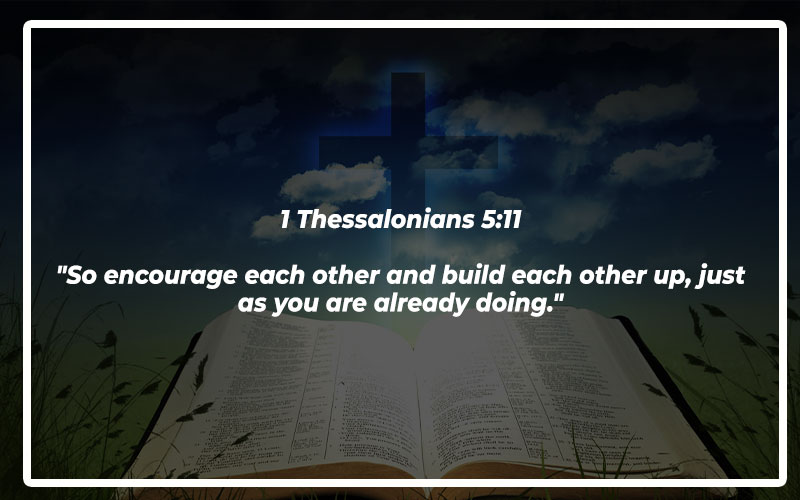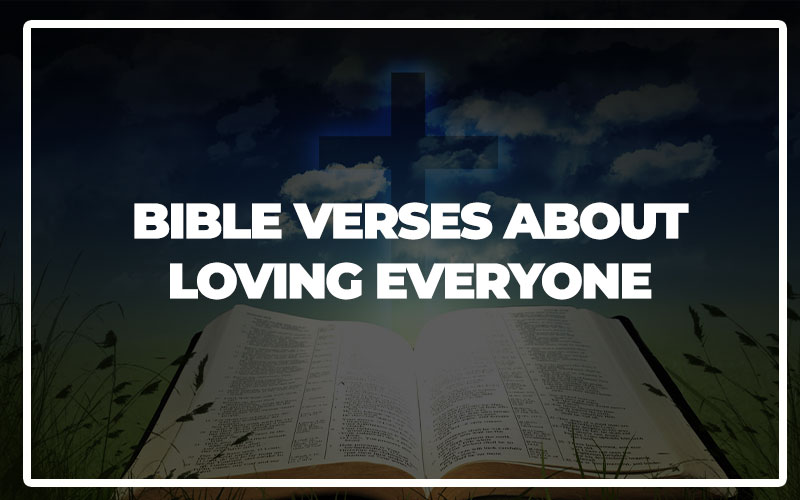The Bible tells us to love our neighbors, but what does that really mean? It’s not just about being nice to the folks next door. It means showing kindness to everyone we meet, even those who are hard to love.
Remember, Jesus loved everyone, and He wants us to do the same. Loving everyone can be tough sometimes, especially when someone’s been mean to us or is just plain annoying. But guess what? God’s love is big enough to help us love even the prickliest of people.
So, let’s dive into Bible verses that remind us how to spread love like peanut butter on toast – thick and generously. Do read on!
Also Read: Bible Verses About Color of Skin
Top Bible Verses About Loving Everyone
Matthew 5:44
“But I say, love your enemies! Pray for those who persecute you!”

This verse challenges us to extend love beyond our comfort zone. Loving our enemies and praying for those who harm us exemplifies a Christ-like love that surpasses human limitations and reflects God’s unconditional love.
John 13:34
“So now I am giving you a new commandment: Love each other. Just as I have loved you, you should love each other.”
Jesus commands His followers to love each other as He loves us. This love is selfless, sacrificial, and enduring, setting the standard for how we should treat one another.
1 John 4:7-8
“Dear friends, let us continue to love one another, for love comes from God. Anyone who loves is a child of God and knows God. But anyone who does not love does not know God, for God is love.”
These verses emphasize that love is the essence of God’s nature. Knowing God means embodying love in our actions and relationships, proving our connection to Him.
Romans 13:8
“Owe nothing to anyone—except for your obligation to love one another. If you love your neighbor, you will fulfill the requirements of God’s law.”
Paul teaches that love is a perpetual debt we owe to one another. Loving our neighbor is not just a moral duty but the fulfillment of God’s commandments.
1 Corinthians 13:4-7
“Love is patient and kind. Love is not jealous or boastful or proud or rude. It does not demand its own way. It is not irritable, and it keeps no record of being wronged. It does not rejoice about injustice but rejoices whenever the truth wins out. Love never gives up, never loses faith, is always hopeful, and endures through every circumstance.”
This passage defines the attributes of true love. It calls us to exhibit patience, kindness, humility, and forgiveness, showing that genuine love perseveres through all challenges.
Galatians 5:14
“For the whole law can be summed up in this one command: ‘Love your neighbor as yourself.'”
Paul reiterates the teaching of Jesus, emphasizing that loving others as we love ourselves is the essence of God’s law. This love should guide our interactions and decisions.
Colossians 3:14
“Above all, clothe yourselves with love, which binds us all together in perfect harmony.”
Love is described as the unifying force that brings harmony to relationships. When we prioritize love, it fosters unity and peace within the community of believers.
1 Peter 4:8
“Most important of all, continue to show deep love for each other, for love covers a multitude of sins.”
Peter encourages believers to maintain deep love for one another, highlighting love’s power to forgive and overlook faults, thereby strengthening communal bonds.
Ephesians 4:2
“Always be humble and gentle. Be patient with each other, making allowance for each other’s faults because of your love.”
Paul advises the Ephesians to practice humility, gentleness, and patience. Love enables us to tolerate each other’s shortcomings, promoting unity and understanding.
1 Thessalonians 3:12
“And may the Lord make your love for one another and for all people grow and overflow, just as our love for you overflows.”
Paul prays for the Thessalonians’ love to increase and overflow, reflecting the abundant love of Christ. This growth in love enhances relationships and witnesses to others.
1 John 4:19
“We love each other because he loved us first.”
Our ability to love others stems from God’s initial love for us. Recognizing His love inspires and empowers us to love one another.
1 John 4:20
“If someone says, ‘I love God,’ but hates a fellow believer, that person is a liar; for if we don’t love people we can see, how can we love God, whom we cannot see?”
John stresses the inseparability of loving God and loving others. True love for God is evidenced by our love for our fellow believers.
Luke 6:35
“Love your enemies! Do good to them. Lend to them without expecting to be repaid. Then your reward from heaven will be very great, and you will truly be acting as children of the Most High, for he is kind to those who are unthankful and wicked.”
Jesus instructs us to love our enemies and do good without expecting anything in return. This kind of love reflects God’s kindness and marks us as His children.
Proverbs 10:12
“Hatred stirs up quarrels, but love makes up for all offenses.”
Solomon contrasts the divisive nature of hatred with the reconciliatory power of love. Love fosters forgiveness and healing, mending broken relationships.
Romans 12:9
“Don’t just pretend to love others. Really love them. Hate what is wrong. Hold tightly to what is good.”
Paul urges sincere love, devoid of hypocrisy. Genuine love abhors evil and clings to goodness, manifesting in authentic and righteous relationships.
Also Read: Bible Verses About Brotherly Love
1 John 3:18
“Dear children, let’s not merely say that we love each other; let us show the truth by our actions.”
John emphasizes the importance of demonstrating love through actions. Love is more than words; it must be evident in how we treat and serve one another.
1 Corinthians 16:14
“And do everything with love.”
Paul’s exhortation to do everything with love underscores the necessity of love in all our actions. Love should be the driving force behind all our endeavors.
John 15:12
“This is my commandment: Love each other in the same way I have loved you.”
Jesus commands His disciples to love each other with the same self-sacrificial love He demonstrated. This love is the hallmark of true discipleship.
Romans 12:10
“Love each other with genuine affection, and take delight in honoring each other.”
Paul encourages believers to love one another with sincere affection and honor. Genuine love finds joy in elevating and respecting others.
James 2:8
“Yes indeed, it is good when you obey the royal law as found in the Scriptures: ‘Love your neighbor as yourself.'”
James reiterates the importance of the royal law, which is to love our neighbors as ourselves. Obeying this command reflects true faith and righteousness.
Philippians 2:3
“Don’t be selfish; don’t try to impress others. Be humble, thinking of others as better than yourselves.”
Paul advises humility and selflessness, valuing others above ourselves. Such attitudes foster a loving and supportive community.
1 John 4:11
“Dear friends, since God loved us that much, we surely ought to love each other.”
John reminds us that God’s immense love for us obligates us to love one another. Our love for others is a natural response to His love for us.
Hebrews 13:1
“Keep on loving each other as brothers and sisters.”
The author of Hebrews encourages believers to persist in brotherly love. Continual love strengthens familial bonds within the Christian community.
1 John 4:21
“And he has given us this command: Those who love God must also love their fellow believers.”
John emphasizes that loving God inherently includes loving our fellow believers. Obedience to God’s command necessitates loving one another.
Romans 12:16
“Live in harmony with each other. Don’t be too proud to enjoy the company of ordinary people. And don’t think you know it all!”
Paul calls for harmonious living and humility. By valuing all individuals equally, we cultivate an environment of mutual respect and love.
1 John 3:16
“We know what real love is because Jesus gave up his life for us. So we also ought to give up our lives for our brothers and sisters.”
John explains that true love is exemplified by Jesus’ sacrifice. We are called to emulate this sacrificial love in our relationships with others.
Ephesians 4:32
“Instead, be kind to each other, tenderhearted, forgiving one another, just as God through Christ has forgiven you.”
Paul urges kindness, compassion, and forgiveness, mirroring God’s forgiveness of us through Christ. These attributes are fundamental to loving relationships.
John 15:13
“There is no greater love than to lay down one’s life for one’s friends.”
Jesus declares that the greatest love involves self-sacrifice for others. This ultimate act of love is the standard for true friendship and commitment.
1 Thessalonians 5:11
“So encourage each other and build each other up, just as you are already doing.”

Paul encourages mutual support and edification. Loving others involves uplifting and strengthening one another through words and actions.
Romans 13:10
“Love does no wrong to others, so love fulfills the requirements of God’s law.”
Paul asserts that love inherently avoids harm to others. By loving others, we naturally fulfill the moral and ethical demands of God’s law.
1 John 3:23
“And this is his commandment: We must believe in the name of his Son, Jesus Christ, and love one another, just as he commanded us.”
John combines faith in Christ with the command to love one another. Obedience to God involves both belief and love, intertwining our faith and actions.
Galatians 6:10
“Therefore, whenever we have the opportunity, we should do good to everyone—especially to those in the family of faith.”
Paul emphasizes doing good to all people, with a special focus on fellow believers. Acts of kindness and love should extend to everyone we encounter.
1 John 4:12
“No one has ever seen God. But if we love each other, God lives in us, and his love is brought to full expression in us.”
John teaches that God’s presence is manifested through our love for one another. By loving others, we make God’s love visible and complete.
Romans 15:2
“We should help others do what is right and build them up in the Lord.”
Paul calls for mutual encouragement and support in doing what is right. Loving others involves guiding and building each other up in faith.
Also Read: Bible Verses About Sisterly Love
What Does the Bible Say About Loving Everyone
As Christians, we are called to love everyone. This might seem difficult, but it’s a central part of our faith. Loving others means showing kindness, compassion, and forgiveness, no matter who they are or what they have done. This love is not just for our family and friends but also for strangers and even those who might hurt us.
The Bible teaches us that love is the greatest commandment. It’s more important than anything else. When we love others, we reflect God’s love for us. God loves us unconditionally, and we should strive to do the same for others. This means loving people without expecting anything in return.
One way to show love is by helping those in need. There are many people who are struggling in our communities. They might need food, shelter, or just someone to listen to them. By helping them, we show them that they are valued and cared for. Acts of kindness, no matter how small, can make a big difference in someone’s life.
Forgiveness is another important aspect of love. When someone wrongs us, it’s easy to hold a grudge. But the Bible teaches us to forgive. Forgiving others frees us from anger and allows us to live in peace. It also shows that we understand everyone makes mistakes, and we all need grace.
Loving everyone also means being patient and understanding. People come from different backgrounds and have different experiences. By listening to them and trying to understand their perspective, we can build better relationships. This doesn’t mean we have to agree with everything they say, but it means we respect them as individuals.
Another key part of loving everyone is to speak kindly. Our words have power. They can uplift and encourage or hurt and tear down. By choosing to speak positively, we can spread love and positivity around us.
Lastly, loving everyone means accepting people as they are. It’s not our place to judge others. God is the only one who can truly judge. Our role is to love and support each other, helping everyone grow in their faith and relationship with God.
In summary, loving everyone is about showing kindness, forgiveness, patience, understanding, and acceptance. It’s about treating others the way we want to be treated. When we love others, we show them a glimpse of God’s incredible love for us. This love can change hearts and lives, making the world a better place for everyone.

